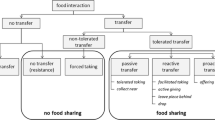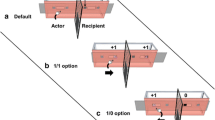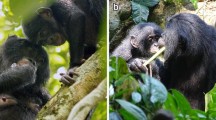Abstract
Food transfer behavior provides a way to distribute food resources among individuals. It is not confined to kin, but also occurs among genetically unrelated individuals. Food transfer among nonkin may result from byproduct mutualism, reciprocal altruism (RA), or tolerated scrounging (TS). Sichuan snub-nosed monkeys (Rhinopithecus roxellana) exhibit a high level of social tolerance, and researchers have observed food transfer behavior in the wild. However, little is known about how tolerant social relations influence food transfer in this species. We recorded food-related interactions and social behavior in a group of captive Sichuan snub-nosed monkeys. Our findings suggest that the monkeys develop partner preference in food transfer behaviors. Moreover, individuals rely primarily on nonharassed approaches to claim food, suggesting that the TS model alone cannot explain their food transfer. Food transfer in this species may be a form of mutualism, in which an individual benefits on an immediate basis by fostering a preferred and tolerant relationship. However, we cannot rule out the possibility of reciprocal altruism. Future studies should record the temporal delay of social exchange to distinguish between mutualism and reciprocal altruism.




Similar content being viewed by others
References
Altmann, J. (1974). Observational study of behavior: sampling methods. Behaviour, 49, 227–267.
Blurton-Jones, N. (1984). A selfish origin for human food sharing: tolerated theft. Ethology and Sociobiology, 5, 1–3.
Brosnan, S., & de Waal, F. B. M. (2002). A proximate perspective on reciprocal altruism. Human Nature, 13, 129–152.
Carins, S., & Schwager, S. (1987). A comparison of association indices. Animal Behaviour, 35, 1454–1469.
Connor, R. (1996). Partner preference in by-product mutualisms and the case of predator inspection in fish. Animal Behaviour, 51, 451–454.
Connor, R. (2007). Invested, extracted and byproduct benefits: a modified scheme for the evolution of cooperation. Behavioural Processes, 76, 109–113.
de Waal, F. B. M. (1989). Food sharing and reciprocal obligations among chimpanzees. Journal of Human Evolution, 18, 433–459.
de Waal, F. B. M. (1997). The chimpanzee’s service economy: food for grooming. Evolution and Human Behavior, 18, 375–386.
de Waal, F. B. M. (2000). Attitudinal reciprocity in food sharing among brown capuchin monkeys. Animal Behaivour, 60, 253–261.
Dittus, W. (1984). Toque macaque (Macaca sinica) food calls: semantic communication concerning food distribution in the environment. Animal Behaviour, 32, 470–477.
Fragaszy, D., & Bard, K. (1997). Comparison of development and life history in Pan and Cebus. International Journal of Primatology, 18, 683–701.
Gilby, I. (2006). Meat sharing among the Gombe chimpanzees: harassment and reciprocal exchange. Animal Behaviour, 71, 953–963.
Goodall, J. (1986). The chimpanzees of Gombe: Patterns of behavior. Cambridge: Harvard University Press.
Gurven, M. (2004). Reciprocal altruism and food sharing decisions among Hiwi and Ache hunter-gatherers. Behavioral Ecology and Sociobiology, 56, 366–380.
Hamilton, W. D. (1964). The genetical evolution of social behavior (I and II). Journal of Theoretical Biology, 7, 1–52.
Hemelrijk, C. K. (1990). A matrix partial correlation test used in investigations of reciprocity and other social interaction patterns at group level. Journal of Theoretical Biology, 143, 405–420.
Martin, P., & Bateson, P. (1986). Measuring behaviour: An introductory guide. Cambridge: Cambridge University Press.
McElreath, R., & Boyd, R. (2007). Mathematical models of social evolution: A guide for the perplexed. Chicago: University of Chicago Press.
Nissen, H., & Crawford, M. (1936). A preliminary study of food-sharing behavior in young chimpanzees. Journal of Comparative Psychology, 22, 383–419.
Palombit, R. (1999). Infanticide and the evolution of pair bonds in nonhuman primates. Evolutionary Anthropology, 7, 117–129.
Perry, S., & Rose, L. (1994). Begging and transfer of coati meat by white-faced capuchin monkeys, Cebus capuchinus. Primates, 35, 409–415.
Rapaport, L., & Brown, G. (2008). Social influences on foraging behavior in young nonhuman primates: learning what, where, and how to eat. Evolutionary Anthropology, 17, 189–201.
Ren, R., Yan, K., Su, Y., Qi, H., Liang, B., Bao, W., et al. (1991). The reconciliation behavior of golden monkeys (Rhinopithecus roxellanae roxellanae) in small breeding groups. Primates, 32, 321–327.
Ren, R., Yan, K., Su, Y., Zhou, Y., Li, J., Zhu, Z., et al. (2000). A field study of the Society of Rhinopithecus roxellanae. Beijing: Peking University Press.
Ruiz-Miranda, C., Kleiman, D., Dietz, J., Moraes, E., Grativol, A., Baker, A., et al. (1999). Food transfers in wild and reintroduced golden lion tamarins, Leontopithecus rosalia. American Journal of Primatology, 48, 305–320.
Stevens, J. (2004). The selfish nature of generosity: harassment and food sharing in primates. Proceedings of the Royal Society of London. Series B: Biological Sciences, 271, 451–456.
Stevens, J., & Gilby, I. (2004). A conceptual framework for nonkin food sharing: timing and currency of benefits. Animal Behaviour, 67, 603–614.
Stevens, J., & Stephens, D. (2002). Food sharing: a model of manipulation by harassment. Behavioral Ecology, 13, 393–400.
Winterhalder, B. (1996). Social foraging and the behavioral ecology of intragroup resource transfers. Evolutionary Anthropology, 5, 46–57.
Wolovich, C., Perea-Rodriguez, J., & Fernandez-Duque, E. (2007). Food transfers to young and mates in wild owl monkeys (Aotus azarai). American Journal of Primatology, 69, 1–16.
Yan, K., Su, Y., & Ren, R. (2006). Social behavioral repertoires and action patterns of Sichuan snub-nosed monkey (Rhinopithecus roxellana). Acta Theriologica Sinica, 26, 129–135.
Zhang, Z., Su, Y., Chan, R., & Reimann, G. (2008). A preliminary study of food transfer in Sichuan snub-nosed monkeys (Rhinopithecus roxellana). American Journal of Primatology, 70, 148–152.
Acknowledgment
We thank Shanghai Wild Animal Park for their logistic support. We also thank Professor Joan Silk and Professor Joseph Manson at UCLA for their valuable suggestions on this article and help with language revision. In addition, we thank 2 anonymous reviewers for their careful review and helpful comments in improving our manuscript. This study was supported by the National Natural Science Foundation of China (grant no. 30770728, 30970907).
Author information
Authors and Affiliations
Corresponding author
Rights and permissions
About this article
Cite this article
Xue, M., Su, Y. Food Transfer in Sichuan Snub-nosed Monkeys (Rhinopithecus roxellana). Int J Primatol 32, 445–455 (2011). https://doi.org/10.1007/s10764-010-9480-9
Received:
Accepted:
Published:
Issue Date:
DOI: https://doi.org/10.1007/s10764-010-9480-9




